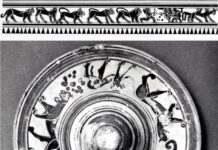Επιμέλεια: Εύα Πετροπούλου Λιανού
I will conclude this work by discussing the human body and medicine, or rather, hygiene. And I will begin this discussion with a topic that is particularly close to my heart: baby diapers.
To change a baby, you need a sheet, preferably cotton, and to be honest, you need several for diaper changes. A piece of cotton measuring 60 by 60 centimeters is quite sufficient for changing an infant. You should have four or five on hand so they have time to dry after being washed, ensuring you can use them constantly. An infant, a baby, needs to have their diaper changed at least twice a day.
The reason I’m talking to you about diapering babies is that during my travels, I realized that many mothers, often those from disadvantaged backgrounds, didn’t have real access to diapers, and that most of them left their children with bare bottoms, with the hygiene risks that entails. Modern life has made women forget about diapers. This needs to stop, and we need to return to diapers for disadvantaged children. They are practically free, eco-friendly, time-honored, universal, and ensure their cleanliness!
Next, I wanted to tell you about two things I’ve happily tried out on myself. The first is a skincare cream that is healing, soothing, and regenerative. The recipe is very simple: take one part honey, add one part lemon juice, and mix it with one part warm water. The results are surprising: the skin absorbs the cream and is completely healed. I developed this mixture as a child to heal my wounds. Healing can sometimes be difficult, but try it; you’ll see that with my recipe, you’ll get amazing results.
The second idea I’m going to share comes from an old medieval book called Le Petit Albert. It’s a very simple solution for dental problems: to prevent teeth from ever rotting—that is, to avoid losing any—place three grains of coarse salt under your tongue to dissolve them, three times a week on an empty stomach, or regularly, before eating. This very simple method gives excellent results. I’ve been doing it for a long time, and it has greatly helped my teeth, which are otherwise fragile. I recommend it; see for yourselves.
Next, to continue with the topic of medicine and hygiene, allow me to share a recipe that is particularly dear to me: a vinegar macerated of plants to create an antiseptic vinegar through an unalcoholic tincture—Four Thieves Vinegar.
Four Thieves Vinegar is an infusion, a maceration, or in other words, a tincture, in vinegar, of common plants such as mint, sage, lavender, garlic, thyme, savory, and cloves. The combined properties of these plants give the resulting antiseptic vinegar particularly beneficial characteristics.
Four Thieves Vinegar is first and foremost an antiseptic, meaning it disinfects. It is also antiviral, thus preventing many known viruses. Furthermore, it is germicidal, vermifuge, tonic, and immune-boosting. It’s a French invention from the High Middle Ages that helped stop the bubonic plague epidemic in Europe and was long listed in our country’s official pharmacopoeia. It fell into oblivion shortly after the beginning of the 20th century. It was I who rediscovered it in old treatises as a child and introduced it to modern readers. Today, everyone praises its properties, and it’s produced in large quantities by pharmaceutical laboratories, which market it widely. You can find it in pharmacies.
This natural remedy, which has no side effects, is highly recommended. Perhaps you already know it: it has seen tremendous growth since the early 2000s. It truly helps our bodies defend themselves against all kinds of ailments, strengthens them, and is particularly recommended for internal use in disease prevention.
I would add here that medical laboratories at various universities around the world are studying its anti-cancer potential, when combined with a small amount of baking soda, as well as its benefits for the remission or reduction of HIV/AIDS symptoms.
This invigorating beverage can, if prepared carefully, easily be made at home.
Timothee Bordenave
In Paris, France.
For Dr. Dalip Ketharpal, University of Haryana, India.
For Mrs. Anna Keiko, Dr. Eva Petropoulou, and Mrs. Lina Leni Marlina.
Along with Pr. Djurovic, and his spouse Ana.


































